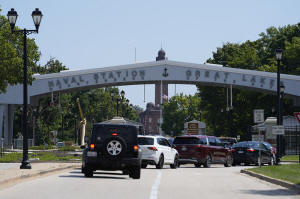Trump administration asks military base near Chicago for support on
immigration operations
[August 29, 2025]
By JOHN O'CONNOR and SOPHIA TAREEN
CHICAGO (AP) — The Trump administration asked a military base outside of
Chicago for support on immigration operations this week, offering a clue
of what an expanded law enforcement crackdown might look like in the
nation's third-largest city.
The Department of Homeland Security asked Naval Station Great Lakes for
“limited support in the form of facilities, infrastructure, and other
logistical needs to support DHS operations,” Matt Mogle, spokesperson
for the base 35 miles (56 kilometers) north of Chicago, said Wednesday.
The request came weeks after the Republican administration deployed
National Guard troops to Washington, D.C., to target crime, immigration
and homelessness, and two months after it sent troops to Los Angeles.
Although details of the administration’s plans for Chicago are scarce,
city leaders said Thursday that they are preparing for multiple possible
scenarios, from troops assisting in immigration arrests to patrolling in
the streets.
“We don’t want to raise any fears,” Police Superintendent Larry Snelling
told reporters. “We don’t want to create any speculation around what’s
going on.”
Chicago leaders want more communication
City leaders said Thursday that the White House hadn't contacted them
about its plans, and a spokesman for the Illinois National Guard said
the base hadn't received requests regarding a Chicago mobilization.
Mogle, the base spokesman, said no decisions had been made on the
request, and that the base hadn't received an official request to
support a National Guard deployment. The Chicago Sun-Times first
reported on the request to the Navy base.

DHS did not confirm whether it had asked to use the base. But it said in
a statement Thursday that it was working to make “our streets and cities
safe again.”
Mayor Brandon Johnson and Illinois Gov. JB Pritzker have pushed back
against a possible mobilization, saying crime has fallen in Chicago and
that the city doesn't want or need the military's help. They are
planning to sue.
City leaders said workers were circulating know-your-rights cards in
neighborhoods with heavy immigrant populations, which offer tips on what
to do in case of an encounter with an immigration agent. Other workers
were checking in on Chicago's homeless encampments and providing
information about shelters since Trump has pushed to move homeless
people far from Washington.
Snelling asked for more communication on plans involving law
enforcement.
“To make sure that we’re not stoking fears through neighborhoods and we
don’t have people running scared and it doesn’t create chaos on our
streets, we’re willing to have those conversations,” Snelling said.
Many Chicagoans are on edge about the rumored deployment. Former
President Barack Obama, who is from Chicago, weighed in Thursday,
posting on X: “The erosion of basic principles like due process and the
expanding use of our military on domestic soil puts the liberties of all
Americans at risk, and should concern Democrats and Republicans alike."
Former President Joe Biden's transportation secretary, Pete Buttigieg, a
former U.S. Naval Reserve intelligence officer who trained at Great
Lakes, said in a post on X that he never imagined the station could be
used “for surveillance and enforcement activity on American soil. Our
military was not set up to cater to the whims of a would-be American
dictator.”
[to top of second column]
|

Main entrance for Naval Station Great Lakes, about 35 miles north of
Chicago, is seen, Thursday, Aug. 28, 2025, in Great Lakes, Ill. (AP
Photo/Kiichiro Sato)

The politics of a deployment
Pritzker, a potential 2028 Democratic presidential contender, has
spent days showcasing parts of the city where crime has fallen and
said there is no emergency in Chicago requiring military
intervention. He told The Associated Press that the presence of
troops could worsen the situation.
Speaking to reporters Thursday, he suggested that it's a political
ploy, not a law enforcement strategy, that Trump will pull out
during next year's elections.
“This is a part of his plan to do something really nefarious, which
is to interfere with elections in 2026,” Pritzker said. “He wants to
have troops on the ground to stop people from voting, to intimidate
people from going to the voting booth.”
Trump has often singled out Chicago, likening it to a war zone and
“hellhole.” Chicago’s long-held status as a so-called sanctuary city
has irked the Trump administration, which used Chicago to kick off a
nationwide crackdown on immigration weeks after Trump's second
inauguration.
Pritzker and Trump, who has zeroed-in on Democrat-led cities, have
traded barbs over the issue for days.
“The people are desperate for me to STOP THE CRIME, something the
Democrats aren’t capable of doing,” Trump posted Thursday on his
Truth Social network.
In recent days, the administration has been pointing out recent
shootings in the city, including at Thursday's White House press
briefing when press secretary Karoline Leavitt listed crime
statistics.
“This is JB Pritzker’s legacy, by the way,” she said.
Crime in Chicago
Violent crime has dropped significantly in Chicago in recent years,
but it remains a persistent problem in parts of the city.
Chicago had a homicide rate of 21.7 per 100,000 residents in 2024,
according to analysis of federal data by the Rochester Institute of
Technology. Seven other major U.S. cities -- St. Louis, New Orleans,
Detroit, Washington, D.C., Atlanta, Indianapolis and Richmond,
Virginia -- had higher rates than Chicago.

Still, Chicago reported 573 homicides in 2024, the most of any U.S.
city that year. At the same time, violent crime dropped
significantly in the first half of this year, representing the
steepest decline in over a decade, according to city data. In the
first six months of 2025, total violent crime dropped by more than
22% compared with the first half of 2024.
In Illinois there are roughly 10,000 members of the Illinois Army
National Guard and 3,000 Air National Guard. They routinely mobilize
at armories around the state, including nearly a dozen in Chicago
and its suburbs. But they are state-owed property and if the federal
government mobilizes the Guard without the governor’s blessing, the
armories aren't available for use.
All contents © copyright 2025 Associated Press. All rights reserved |